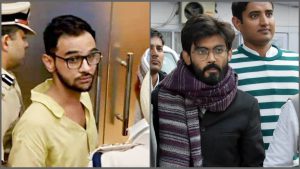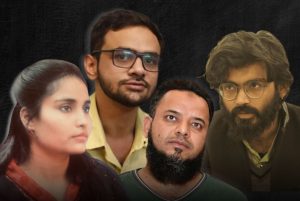Synopsis: Delhi Riots bail pleas of Umar Khalid, Sharjeel Imam, and others dismissed by High Court under UAPA; judgment highlights prolonged conspiracy case still at charge-framing stage.
By | Qalam Times News Network | New Delhi, September 2, 2025
High Court Verdict

The Delhi Riots conspiracy case witnessed another turning point today as the Delhi High Court dismissed bail applications filed by Umar Khalid, Sharjeel Imam, and seven other accused persons. A Division Bench comprising Justice Naveen Chawla and Justice Shalinder Kaur announced the ruling at 2:30 pm, with Justice Kaur reading out the line: “All appeals are dismissed.” Nearly five years after the February 2020 violence, the case continues to remain at the stage of charge framing.
The verdict also covered co-accused Athar Khan, Khalid Saifi, Mohd Saleem Khan, Shifa-Ur-Rehman, Meeran Haider, Gulfisha Fatima, and Shadab Ahmed. In a parallel order, a separate bench of Justice Subramonium Prasad and Justice Harish Vaidyanathan Shankar denied bail to another accused, Tasleem Ahmed, under FIR 59 of 2020.
Background of the Case
The Delhi Riots of February 2020 left 53 people dead and over 700 injured. The Delhi Police Special Cell alleged that the violence was orchestrated as part of a “deep-rooted conspiracy” linked to protests against the Citizenship Amendment Act (CAA). FIR 59 was registered on March 6, 2020, and since then, five chargesheets have been filed, citing over 897 witnesses. Out of 18 originally arrested, 12 remain in custody.
The prosecution claims that WhatsApp groups, protected witness statements, CCTV footage, and digital records reveal coordination of protests across 23 sites, allegedly designed to escalate into a nationwide blockade timed with US President Donald Trump’s India visit in February 2020.
Key Bail Arguments
Umar Khalid argued that his mere presence in WhatsApp groups did not amount to criminal conspiracy, stressing that no recovery was made from him and that no witness attributed terror acts to him. Sharjeel Imam highlighted that his last attributed speech was in January 2020, well before the riots, and sought statutory bail under Section 436A CrPC. Khalid Saifi and others pressed for parity with co-accused already granted bail, questioned the reliance on ordinary messages, and pointed to long years in custody.


Gulfisha Fatima, Meeran Haider, Mohd. Saleem Khan, Athar Khan, Shifa-Ur-Rehman, and Shadab Ahmed all echoed arguments of prolonged incarceration, delay in trial, and lack of direct evidence.
The State’s Position
Solicitor General Tushar Mehta, supported by Special Public Prosecutor Amit Prasad, opposed all pleas. They described the investigation as one of the most detailed ever undertaken, asserting that the Delhi Riots were pre-planned and aimed at dividing communities. The prosecution cited speeches by Sharjeel Imam as a timeline for escalation, alleged use of financial irregularities and forged documents, and pointed to weapons such as a large iron catapult as evidence of violent preparation.
Mehta strongly argued that national security considerations outweigh long incarceration, stating during the hearing: “If you are doing something against the nation, then you better be in jail till you are acquitted or convicted.”
Where the Case Stands
With today’s ruling, all major accused in the Delhi Riots conspiracy case remain behind bars under UAPA provisions. The matter is still at the argument stage for charge framing, five years after the riots, leaving questions about prolonged trials, civil liberties, and the balance between security and justice.







